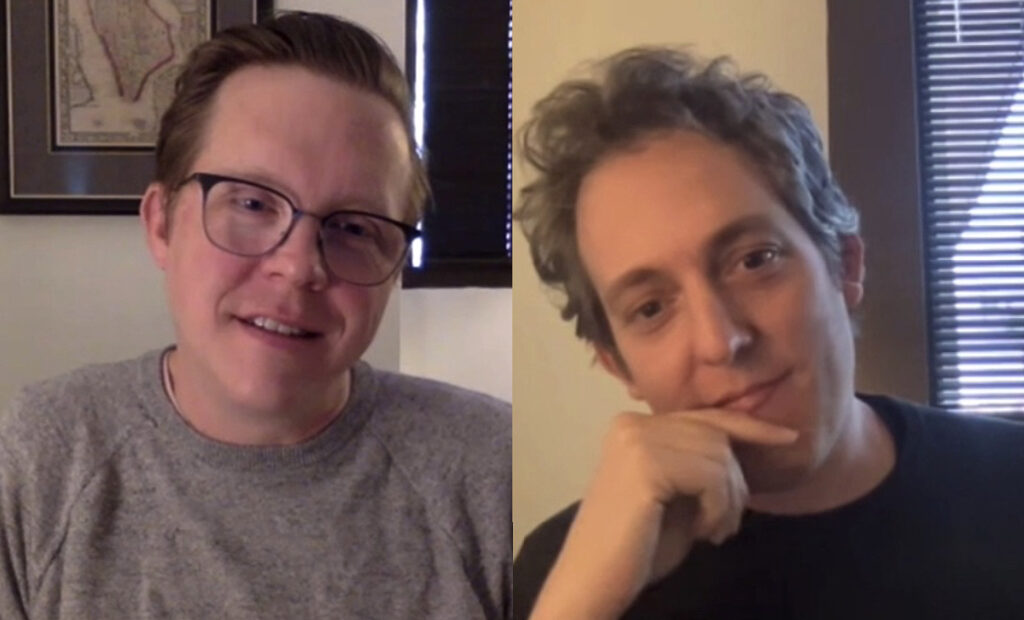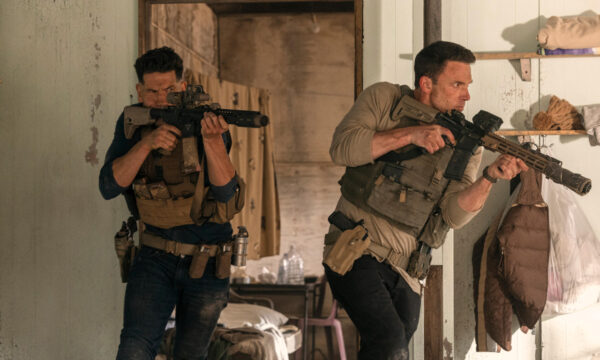“That constant evolution of where our characters are at is a really unique aspect of our show”: Writers Ben Nedivi and Matt Wolpert on season three of For All Mankind

Apple TV+ original sci-fi series For All Mankindis back again for another season. It first launched with the streaming platform back in 2019 and boasted the star-studded cast of Joel Kinnaman, Michael Dorman, Shantel VanSanten and Jodi Balfour. Set in an alternate universe where Russia has achieved the first moon landing,For All Mankind explores how that one small change in history sparks a series of new events that open doors for more competent workers within the space program, and how that in turn accelerates space science and technology.This third season takes a look at finally making it to Mars, and all the possible players for the mission.
Born out of showrunner Ronald D Moore’s what if discussions with NASA astronaut Garrett Reisman, For All Mankind is written by Moore, Matt Wolpert and Ben Nedivi. Its third season, out this June, takes place ten years after the events of season two, testing bonds and friendships within the remaining cast of characters. The Upcoming caught up with Wolpert and Nedivi to discuss mapping out the trajectory of each character’s story, how far the Apple TV+ streaming platform has come, and how the differences from real-life history in their alternate world aid in the success of the space missions and programs in the series.
First of all, what’s your favorite part about coming back in to work on this series and with this particular cast and crew?
Matt Wolpert: I would say that my favourite thing about coming back to work on this series is just getting to work again with these people that we’ve made two seasons of the show with. We really all have become a very tight-knit family. Just seeing what everyone is going to bring to the table each season is really exciting, because everybody brings new ideas and their passion to the project. I think that’s why the show stands out: because of the passion and the effort that everyone on the crew and the cast puts into every minute of the show.
Ben Nedivi: I get a kick out of how we jump a decade every season. It’s sort of a show that there’s never a dull moment in. The crew and cast have to be on–game in terms of, “OK, we’re jumping in time, I’m ten years older”. That involves aging, prosthetics; they work on their voice, on their body movement; the sets and the designs all have to change, and the technology. It really involves a lot of work, and I think that the enthusiasm and passion everyone has for it every season keeps us on our toes. I think that’s good for a TV show as you get into the later seasons.
For All Mankind is one of the first Apple TV+ series the platform had when it first launched as a streaming service back in 2019. How does it feel to know how far the platform has come and how, even until now, your work is still a very big and ongoing part of it?
BN: I get it, you know. I do get a kick out of the idea that we were one of the first to launch with the program, because I feel like we have a firsthand view of the growth of Apple TV+ over these past few years. Like, seeing how, early on in Season One, it was really hard to get much attention, but then you see how, over these seasons, over these years, the buzz for Apple shows and for our show has grown as more and more people catch on. I think that’s been really fun to see. And, in the end, it’s about the quality of the shows. There are a lot of shows on the platform that I love, and I think just seeing the word of mouth for our show and how that’s built has been really exciting.
Ben, you talked about the growing buzz surrounding For All Mankind. As Season Two released and progressed, were there things about Season Three that you guys changed when you saw people’s reactions?
BN: We try not to do that. I think one of the things that helps is we’re already usually working on the next season when the previous season is out. By the time we get people’s reactions, we’re already sometimes a quarter of the way, halfway through the next season. There are times li, “Oh, people reacted to that in a way differently than we thought”, but I think it helps creatively to be in a bubble and not pay so much attention to what people are saying on social media. Because then you’re reacting more than you’re being active about what you feel the characters should be doing. So we try as hard as possible, although it gets harder and harder to avoid reacting in our writing.
MW: I agree. I think it’s always important to keep your eye on what is true to the character and the story. Of course, there are times where you can’t help but hear the “Why is she doing that?” – we heard lots of shouts of that in Season Two, just in the ether. But you have to kind of move forward with the story that you think is right for the characters, and just put it out there for people.
There are, of course, large time skips between each season. Is there any difficulty in trying to map out where each and every character would be ten years into the future – what would make sense for them, and what would help cultivate the story even further?
MW: I wouldn’t say there’s difficulty – I think that’s actually one of the most fun parts of the process for us, trying to imagine what happened in the intervening years: how did these people wind up in these places that are unexpected – that the audience wouldn’t have guessed? That’s how life is; you lose touch with somebody, and ten years later, they’re in a totally different situation in their lives. The questioning of how did that person go from point A to point B is fascinating to unpack for us as, writers.
BN: I agree. One of the other things that’s really interesting is, early on in the show, we had a plan for where we want some of these characters to be. Now we’re in Season Three and seeing that plan be executed – it’s one thing to say I want the character to do this by in 20 or 30 years from now, but then to actually be there and see that character, see the ageing and the amount of work that went into that. You finally see that character in that environment, and it works – it’s really gratifying. It’s not to say that we stuck to everything we said we would do in the beginning. I mean, there are changes as we go because we want to give ourselves a little flexibility. But I’m constantly amazed by how much we have stuck to the original plan.
Do you guys have any objections from the actors about where their characters have ended up when you start a new season?
MW: They’ve only ever been onboard!
BN: Actors, protest? Never!
MW: And honestly, we have a beautiful cast. Having to tell them, “We’re going to make you look like old people, every year you’re going to get older and older”… there are some fun conversations, I will say.
BN: Yeah. It’s funny how the Hollywood thing is usually to make people look younger. I think we’re the one show that goes out of our way to try to make everyone look older, so that’s been an interesting struggle. But I have to say, for the most part, they’ve been game to kind of go there and really embrace it.
There is always a fight to prove you’re the right person for the job – it’s a continuous theme throughout For All Mankind. How do you tackle that subject delicately with a cast of so many competent characters who have a lot to offer?
BN: That’s one of the things that was really interesting with the show – the idea that we have so many more competent people in our alternate history than our actual history, because things have opened up to different groups that weren’t part of the equation in real history. I think that was really interesting in Season Three to see where someone, who would usually be a given for a certain role, suddenly has competition for that role. And, really, it’s not just about who has the most experience; it’s about who’s the most equipped, who’s the most experienced for this kind of mission, when we talk about Mars. The difference in the 70s and the early part of NASA was they wanted tough fighter pilots. That was their objective. Now, in the 90s, they need engineers, they need people who will be valuable in Mars in a long-term mission. Those requirements lead to different kinds of needs for leadership, which sets up some really nice rivalries this season.
MW: One of the other things I think is really fascinating about our show is that, in Season One, when the female ASSCANS came into the program, they were kind of the new guard challenging the old guard of those older white guy fighter pilot astronauts. And now, as the show evolves, those women who were the new guard have become the old guard in Season Three. They are in the positions of power, and there’s a new group of people that are now challenging them for a slot. That constant evolution of where our characters are at is a really unique aspect of our show.
Mae Trumata
For All Mankind: Season Three is released on Apple TV+ on 10th June 2022.
Watch the trailer for For All Mankind: Season Three here:

























Facebook
Twitter
Instagram
YouTube
RSS